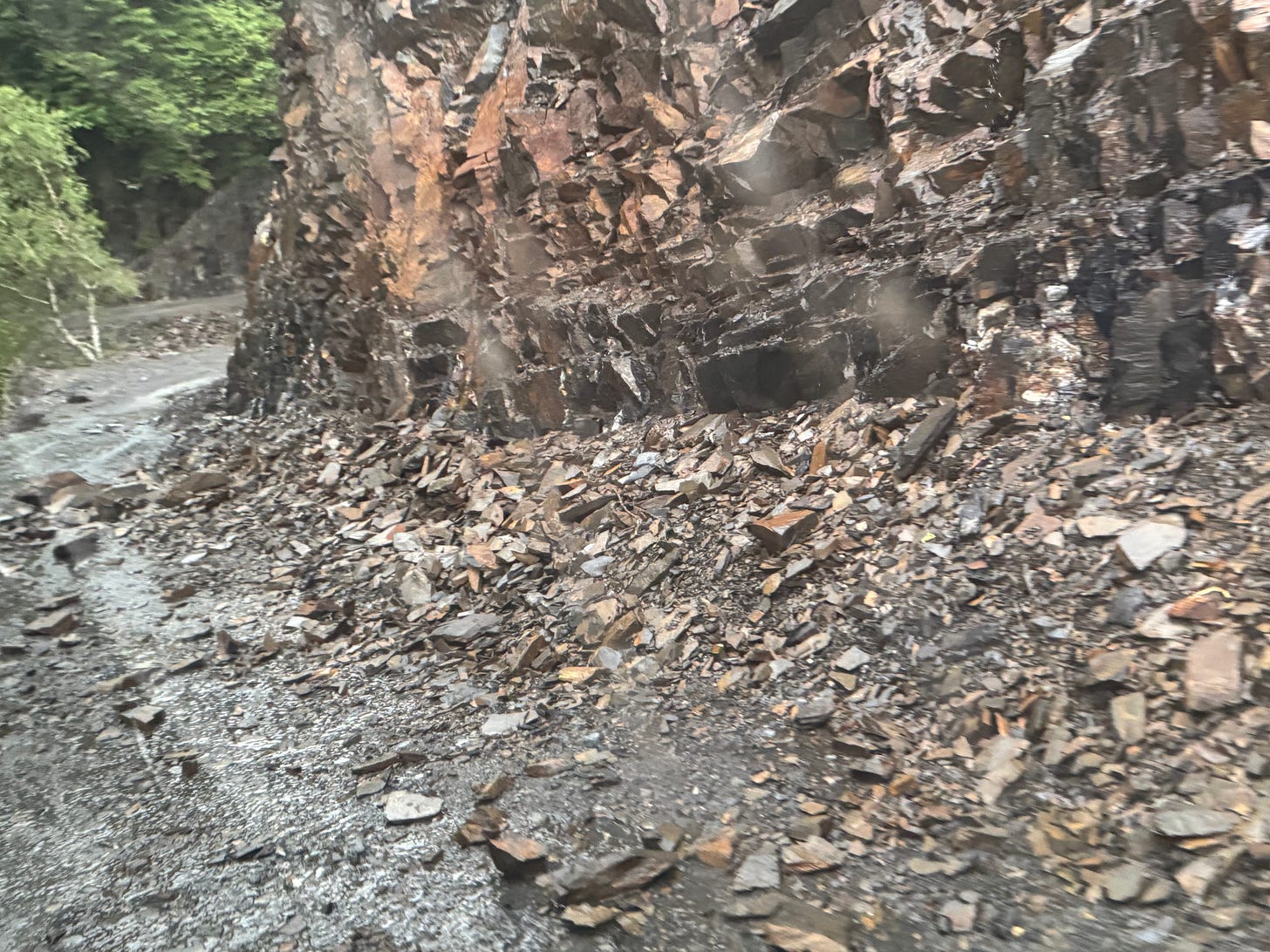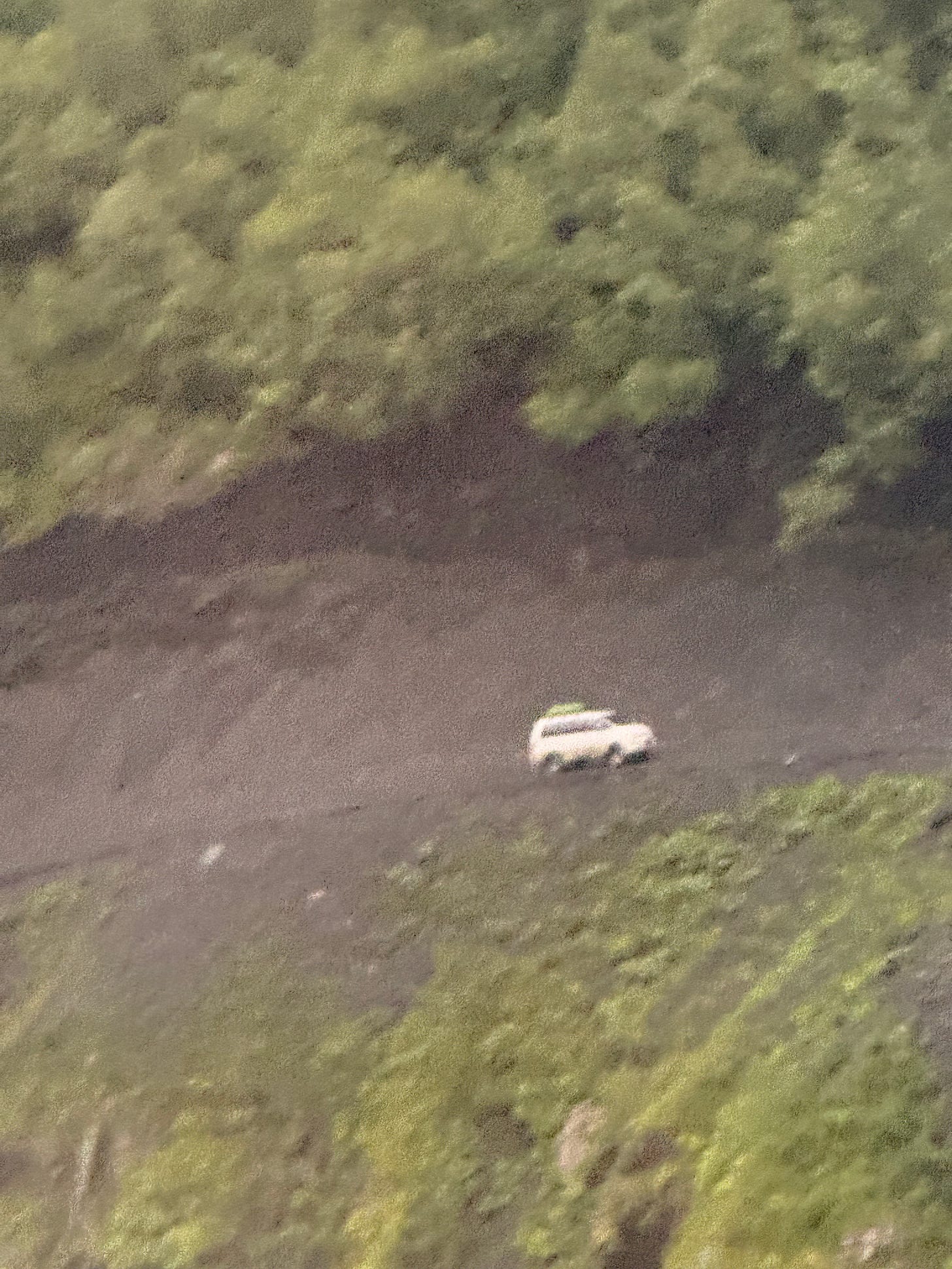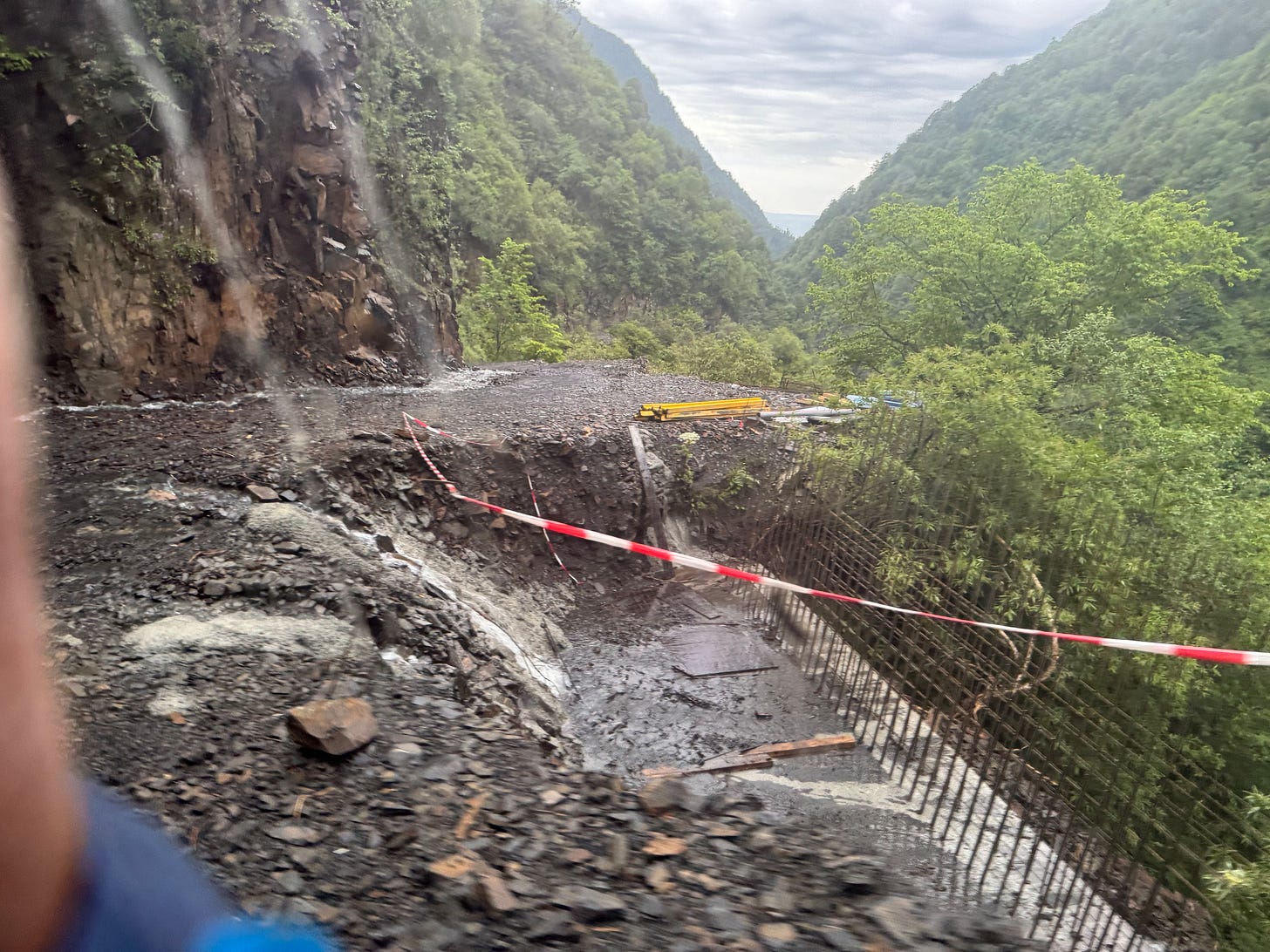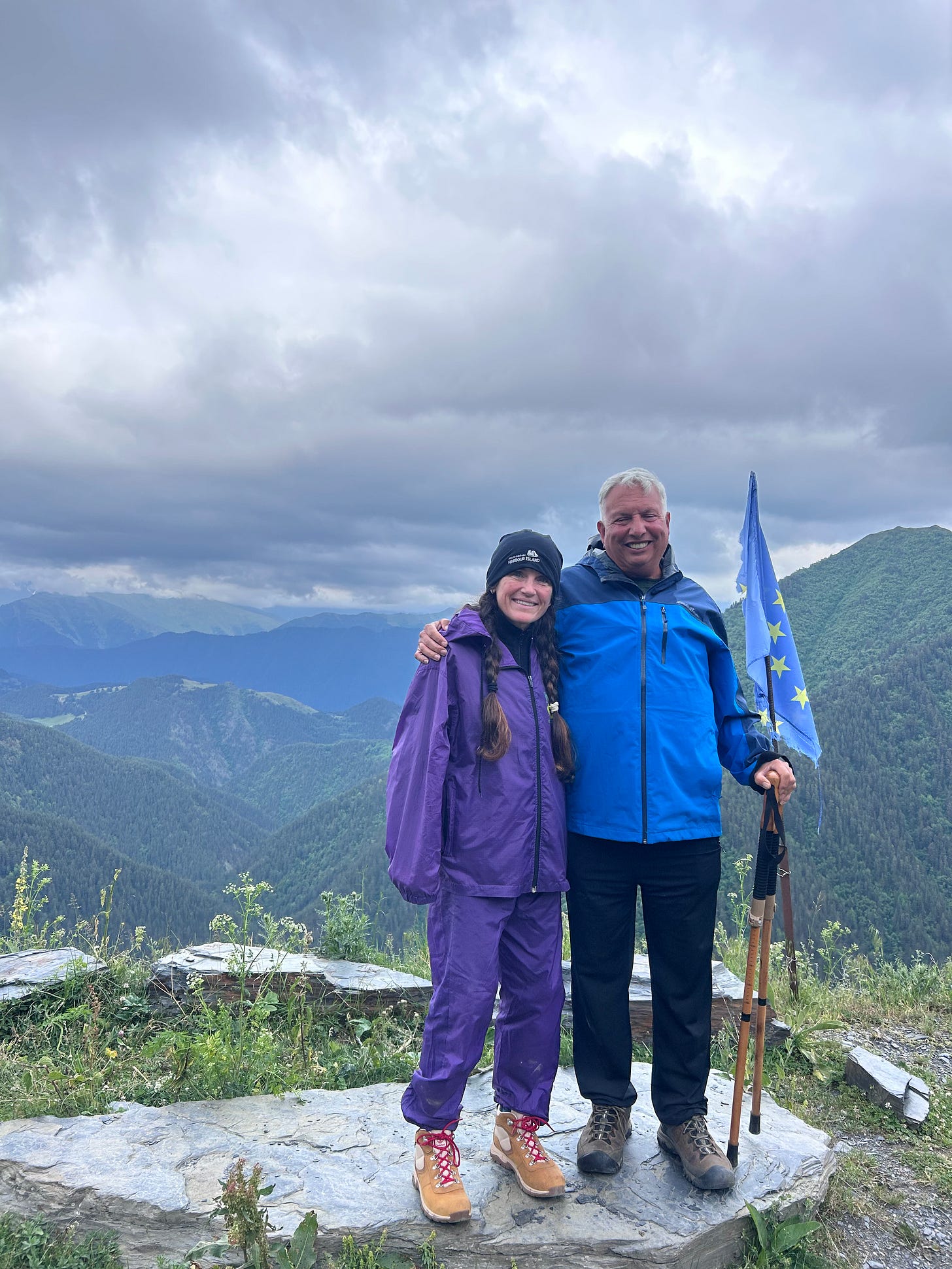We awaken well before 6:15 am, bleary eyed but eager to make a run for it. We don’t waste time with breakfast, but we’ve accumulated a buffet of sorts of leftover bread, fruit and candy for the ride.
Jonah calls Daji. No rain and no news about the road conditions. Ever optimistic, we stow our luggage and enter the van.
I at first think it may be my imagination, but the road appears narrower, as if the edge of the road facing the abyss has crumbled. Indeed, as I look ahead at the winding roadway, I see that’s actually the case in some spots.
It’s not my imagination that the road has a new collection of rocks to be avoided. Davit performs his repeated slaloms well, and he and Jonah make repeated stops to remove the occasional obstacle.
The number and volume of “Georgian car washes” have grown considerably.
We’re relieved that the lake has retreated and no longer covers the road. Jonah estimates that the waters have dropped three feet since we traversed them two days earlier. We cheer when we reach the other side and tell ourselves it’s a good sign for what lies ahead. Even the water seems less silty, another positive sign.
A few moments later, Davit brakes and looks into the rearview mirror. He stops and gets out, then climbs back in. He speaks briefly to Jonah, who rolls down his window and peers behind us.
“Davit lost sight of the van that was following us,” Jonah says. “It’s an unspoken rule that we keep an eye on each other and help whenever it’s needed. Where we are, that can mean the difference between life and death.”
The missing van appears next to us. The driver exits and tries to shut the rear door. David helps tame the unruly clamp. It’s an exercise we experience three more times before the door seems to cooperate. Inconvenient but not life-threatening.
Our stop at Daji’s place on the summit lasts long enough for a hug, a pastry and a potty break at one of the highest outhouses in Europe (9,000+ feet). Altitude records aside, it’s likely one of the scariest to navigate, thanks to worn and broken wooden planks leading to the dilapidated privy. As Daji continues the expansion of her cafe, I hope a new toilet facility will be in the plans.
In the meantime, the view from the outhouse to the snowy peaks of Tusheti is breathtaking (that’s if you want to inhale at that point).
Jonah and Davit are excited to see that cars are coming up from the direction we’re headed. That means that the road has been fixed, and we can likely make it through as well. Daji confirms that and shows them a video on her phone of two cars making it across what hours before had been a chasm.
We soon find that “fixed” might be a relative term. Dirt has been brought in to fill the temporary metal framing that acts much like a bridge. We approach the former chasm. Knowing that closing my eyes will eliminate all danger, I squeeze them shut until I hear Davit and Jonah shouting. I have no idea what they’re saying, but it seems happy. My open eyes reveal a solid–albeit narrow, rutted and strewn with rocks–roadway ahead of us.
We also survive several other repair sites including one that didn’t instill much confidence in Davit. He asks us all to exit the van and cross the not-entirely-repaired section of roadway by foot. Just in case. The van comes scarily close to the edge but makes it safely across. We take our seats again, and the remainder of our descent is uneventful.
By now, our camaraderie has evolved into a form of “tour van karaoke.” With almost certain death no longer at the forefront of our consciousness, Jonah plays a lilting Georgia pop song, and we whoop and scream our way through every chorus. At our bidding, he hits repeat. Twice.
The Americans sing along to “Pink Pony Club,” much to the amusement of the others, who wouldn’t know a Chappell from a chapel. Still, by the third chorus, everyone is singing along.
And then, ultimately and sadly, our journey comes to an end. We promise to keep in touch with each other, a promise often made and nearly just as often broken by tour groups such as ours. I don’t think that will be the case with us.
Our crew of travelers, guide and driver had created a WhatsApp group and named it “Stranded in Tusheti.” Nearly a week after our safe return, our motley survivors keep up the conversation.
This is borne out in a random encounter in this city of more than 1 million. As Kathi and I walk toward our apartment, we pass a random statue in a random and somewhat out-of-the way park. We turn around to study an inscription on the statue’s pedestal. Seconds later, we cross paths with the aforementioned young woman #2, known to family, Icelandic beau and friends as Jessika.
Kathi is leaving Tbilisi tomorrow, and we discuss the warm camaraderie at a cafe. We agree that the conversation will continue. We’re confident the friendships will.
If we hadn’t stopped to read the inscription, those paths would not have intersected. We decide to merge our paths and set out for a cafe and later to a restaurant Jessika knew. We reminisce about our journey. As we discuss our departure plans from Tbilisi, eyes tear up. Both Kathi and Jessika will be flying home the next morning. The others in our group are already gone.
While our extended Tusheti adventure was neither an ordeal nor life-threatening, it had bonded our group together. As Kathi and I said goodbye to Jessika, our parting words were not those of random strangers who had shared a van tour but of new-found friends.
As we hugged our farewells, I thought about why I love travel so much. It’s not just the sights you see and the culture you experience. Perhaps even more so, it’s the friends you make.
Our tour was operated by Friendly.ge, based in Tbilisi. After multiple tours with them, I rank the company among the best I’ve encountered in more than a half-century of travel. I especially appreciated their professionalism and support during our extended tour. It’s highly unlikely you’ll be lucky enough to face a multi-day stranding like the one I’ve described, but I guarantee you a fun experience even without a washed-out road.







